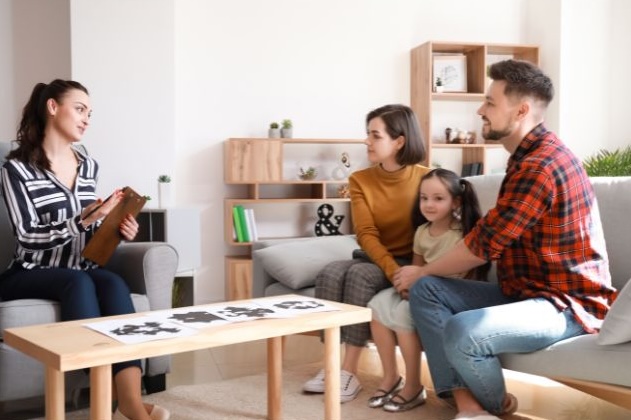A conversation about mental health services for kids, tweens, and teens wouldn’t be complete without covering psychological and psychoeducational testing for kids. Woohoo!
What is Psychological and Psychoeducational Testing?
Psychological and psychoeducational testing for kids both aim to assess a child’s unique strengths, challenges, and needs. These evaluations involve standardized assessments, clinical interviews, and observations. They gather insights into a child’s cognitive, emotional, social, and behavioral functioning.
Both types of testing provide valuable information for diagnosing conditions, guiding interventions, and supporting a child’s development at home, school, and in therapy.
Key Differences Between Psychological and Psychoeducational Testing
While psychological and psychoeducational testing for kids share common methods, they differ in focus and depth.
- Psychological Testing: Focuses on mental health conditions and emotional and behavioral functioning. Diagnoses include anxiety disorders, mood disorders, trauma, and neurodevelopmental disorders. Recommendations often guide therapeutic interventions.
- Psychoeducational Testing: Focuses more on cognitive and academic skills. It identifies learning disabilities, processing deficits, and educational needs. Recommendations provide school accommodations, teaching strategies, and specialized support.
Psychoeducational testing for kids may assess some mental health disorders, such as anxiety and ADHD, but not as extensively as psychological evaluations.
Where to Find Testing Services
School-Based Testing Services
Your child’s school can be a great starting point for psychoeducational testing for kids. Schools typically offer these services through special education programs. School psychologists or educational diagnosticians conduct evaluations, including IQ tests, academic assessments, and behavioral screenings.
However, school-based testing may focus mainly on eligibility for special education rather than detailed emotional and mental health evaluations.
Community-Based Testing Services
For a more comprehensive evaluation, consider community-based psychological and psychoeducational testing for kids. Private clinics, hospitals, and specialized centers offer broader assessments. Licensed psychologists, neuropsychologists, and other professionals can assess both psychological and educational areas.
Community-based testing provides a more personalized approach and is especially helpful for emotional, behavioral, or complex learning concerns. While private testing may involve out-of-pocket costs, some services may be covered by insurance. Check with your provider to explore options.
How to Choose the Right Testing Option
You may start with school-based testing and add community-based testing if needed. Alternatively, you can go directly to a private provider for a comprehensive evaluation. Consult your child’s school counselor, pediatrician, or therapist for guidance.
Why Seek Psychological and Psychoeducational Testing for Kids?
- Academic Struggles: Testing can uncover learning difficulties and guide personalized support.
- Emotional or Behavioral Concerns: Identifying the root of outbursts, withdrawal, or defiance can guide interventions.
- Attention and Focus Issues: Testing clarifies whether ADHD, anxiety, or another issue affects focus.
- Social Challenges: If your child struggles with friendships or social interactions, testing can provide insights.
- Clarifying Symptoms: Testing pinpoints exact issues when symptoms overlap, ensuring targeted support.
Check out this post on recognizing mental health issues in kids and teens for a more comprehensive list of signs and symptoms
Who Conducts Psychological and Psychoeducational Testing for Kids?
Types of Professionals
- Licensed Psychologists (Ph.D. or Psy.D.): Provide broad assessments and specialize in working with children.
- School Psychologists: Focus on learning and behavioral assessments in school settings.
- Neuropsychologists: Conduct in-depth evaluations for neurological or developmental concerns.
- Educational Diagnosticians: Identify learning challenges and work closely with educators.
Key Credentials to Look For
- Licensed Psychologist (LP, Ph.D., or Psy.D.): Fully licensed to perform evaluations.
- Certified School Psychologist (Ed.S.): Qualified for school-based assessments.
- Board-Certified Neuropsychologist (ABPP-CN): Specializes in brain-behavior relationships.
What Happens During Testing?
Psychological and psychoeducational testing for kids includes interviews, standardized tests, observations, and caregiver input through questionnaires. Caregivers provide crucial information about the child’s behavior and learning.
Evaluations are designed to be engaging and child-friendly. They help children feel comfortable as they share strengths and challenges. Parent involvement ensures the evaluation captures a complete picture.
Reviewing Results and Planning Next Steps
After testing, the professional will review the results with you. You’ll receive a detailed report outlining your child’s strengths, challenges, and recommendations for home, school, and therapy.
Reports can sometimes feel overwhelming. If your child has a therapist, share the report with them. They can help explain the findings and guide you through next steps.
Final Thoughts
Psychological and psychoeducational testing for kids can feel like a big step, but it provides invaluable insights into your child’s world. Whether your concerns are academic, emotional, or behavioral, these evaluations help you see the whole picture and find the right support. If you’re considering testing, reach out to your child’s school, therapist, or pediatrician to find a trusted professional who can guide you through the process..


